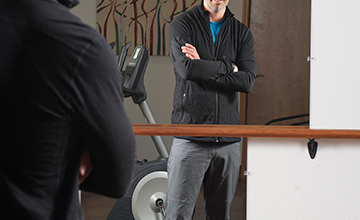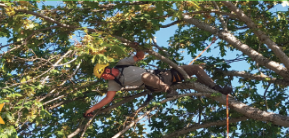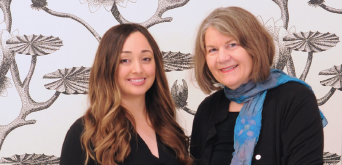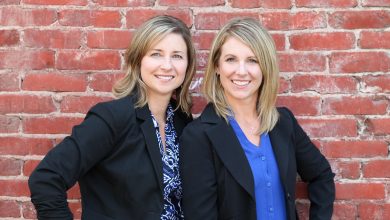Dr. Mark Force – Treating the Root Not the Symptom
Introducing Dr. Mark Force, a chiropractic physician recently relocated to Ashland from Scottsdale, Arizona. With over 30 years of practice Dr. Force has helped thousands of patients heal from chronic illness. With a specialization in natural and functional health care, Dr. Force’s approach is to help restore our innate capacity to heal and to be well, rather than treat symptoms. In today’s interview I spoke with him to learn more about his ultra successful clinic in Scottsdale, as well as to learn more about his process for finding, identifying, and treating the cause of a patient’s suffering.
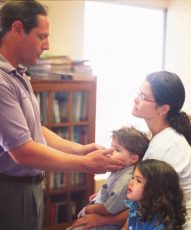 Dr. Force thanks for taking the time to speak with us today and congratulations on opening your new practice here in Ashland.
Dr. Force thanks for taking the time to speak with us today and congratulations on opening your new practice here in Ashland.
Thank you! It’s so much fun to be in practice again! I hadn’t realized how much I’d missed it until starting up again. For the last 2 years I’ve been on sabbatical after selling my practice in Scottsdale, Arizona.
In that practice we saw people from all walks of life and treated a huge range of health conditions – neurological, immunological, hormonal, intestinal, musculoskeletal, developmental. We had a great team doing exams I didn’t need to do directly – EKGs, spirometry, heart rate variability, in-house labs, meridian graphing – and patient education. We also held regular lectures teaching people how to practice self-care and how to use Choosing Health – a self-care workbook I wrote.
Everything was data driven. To help people get well, you have to examine and measure and diagnose. Most patients with complex, chronic, and unresponsive illnesses have never really been diagnosed – they don’t have a functional diagnosis that includes the process of their illness.
My intention is to reproduce that model, because I know first-hand what it can do. It’s such an incredibly beautiful thing to see people heal and be able to live their lives bigger and brighter!
That is very inspiring to hear. Dr. Force can you please tell us more about your personal story and path to wellness.
When I was 14, I was given a gift. I contracted mononucleosis and developed a post-viral chronic fatigue immunodeficiency syndrome that resulted in ulcerative colitis. My mother took me to a bunch of docs until I ended up sitting across from a doc who said, “Son, I’m putting you on cortisone and, if that doesn’t work, we’ll need to take part of your colon out.”
That was my transformative moment. I had my mom drop me off at the library on the way home. I was going to find the answer, because the answers I was being given just weren’t good enough. I started looking for answers and haven’t stopped.
I was lucky enough to discover in the library the book that put me on the path – The Stress of Life by Hans Selye, MD. Selye developed the models of stress we use today in medicine and healthcare including General Adaptive Syndrome, Hypothalamic-Pituitary-Adrenal Axis, and stress subgroups (physical, chemical, mental).
That led to whole food diet, vegetarianism, juicing, fasting, yoga, tai chi, qigong, strength training, aerobic training, meditation, breath work (pranayama), chiropractic, cranial osteopathy, acupuncture, herbs, homeopathy, vitamins, minerals, and other nutrients.
And, I healed. So the work I do now is personal. I know what it’s like to be really sick and frustrated and “dropped through the cracks.” It’s a mission for me to see people well and whole and free.
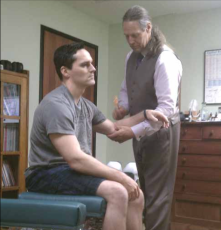 You have then been in practice for more than 30 years now. Please tell us about your professional training and practice experience.
You have then been in practice for more than 30 years now. Please tell us about your professional training and practice experience.
Western States Chiropractic College in Portland is my alma mater. They had a very strong program – human dissection, neurology, biochemistry, biomechanics, kinesiology, diagnosis, gynecology, obstetrics, minor surgery, clinical nutrition.
I’m a diplomate and certified teacher for the International College of Applied Kinesiology (ICAK) and a fellow of the International Academy of Medical Acupuncture (IAMA). I’ve taught for the IAMA in the past, but am not active currently. I practiced acupuncture for 30 years in Arizona, but it’s not within my scope of practice in Oregon. A curriculum vitae is on the website.
You are then also a very active lecturer and educator.
I’m currently lecturing around the country to docs (DCs, DOs, MDs, NDs) on Central Sensitization, the pathophysiology that leads to fibromyalgia, chronic fatigue, PTSD, post-concussion syndrome, multiple chemical sensitivities, and many other conditions. This year I’m slated to lecturer on this topic in Canada and Europe to docs of all fields
I also teach applied kinesiology, clinical nutrition, cranial osteopathy, and physical, neurological, and laboratory diagnosis. I’ve been an editor and contributor for manuals on lab diagnosis and natural healthcare for the clinician. Genetic Data Curation for a Functional Medicine Practice is a course I’ve been recently asked to develop.
Through practice in Scottsdale, I also mentored naturopathic students at Southwest College of Naturopathic Medicine. Over the years, I’ve helped Standard Process Labs and Biotics Research develop nutritional formulas and have done clinical outcome studies.
Can you please talk more about functional healthcare?
In medicine/healthcare as a whole, docs can treat symptoms or systems. Treating symptoms can be a stopgap, but it doesn’t heal. Healing requires restoration of function to body systems – neurological, hormonal, immunological, biochemical, emotional.
Functional healthcare is systems driven. It is also data driven – as a doc, you must have metrics/measures to know where they are and for measuring outcomes from care.
Functional healthcare is about restoring the innate ability of a patient to heal and self-regulate.
Dr. Force can you please tell us more about the scope of your practice? Are there any particular conditions that you are best suited to work with?
The scope of my practice is body function! That leaves a lot of ground. I have always had a family practice and helped with pre-conceptual to geriatric care; sports performance to digestive problems. It’s the nature of my area of expertise.
Having said that I’m perfectly clear I’m not the best doc for every problem. My stand is that I’ll figure out where a patient is and what they need and will either be the best person to get the job done or get them to the best person for that problem. I’m proud of the referral network I developed in Scottsdale and am excited to develop a first-rate network here. Often the best path for a patient is a team approach.
A central part of your work involves knowing how to ask the right question. Please talk more about this.
Dr. George Goodheart, founder of applied kinesiology, always implored us to ask, “Why is that?” That question should always be formost in a clinician’s mind. It’s common for people to think that muscle testing is applied kinesiology, but it’s not. Applied kinesiology is a diagnostic mindset that includes history, physical, orthopedic, and neurological exam, laboratory findings, imaging studies and muscle testing. Applied kinesiology is also a mindset that contextualizes all of the data together and in terms of body functions.
Can you please talk about the difference between homeostasis and allostasis? Also, why is it important to never make health care assumptions and how does one avoid this?
Allostasis refers to the process of the body moving towards a functionally balanced and harmonious state while homeostasis is the term for the body being in a balanced and harmonious state.
There tend to be a lot of assumptions in healthcare – of all types and from all quarters.
For instance, in conventional medicine it is common to screen a patient for hypothyroidism with a Thyroid Stimulating Hormone test and assume that, if it’s normal, their thyroid is functioning normally. It’s not true-more tests are needed to really know.
In natural healthcare, it’s common to assume when the patient looks fine and feels fine that they are fine. That’s not true either. You must have objective measures!
You have issue about how SIBO (small intestine bacterial overgrowth) is treated. Why is that?
The treatment for SIBO is typically antibiotics – herbal or prescription. This doesn’t work because the overgrowth itself is a symptom, not the cause. I have seen many people who have done six or more course of antibiotics for this and still have it.
The peer-review, PubMed listed literature is really clear about what is associated with SIBO – high stomach pH, slow small intestine transit, and an open valve between the large and small intestine that allows reflux from the large to small intestine. Antibiotics won’t fix this!
All these functions are regulated by the vagus nerve. Normalizing regulation of the vagus – a cranial nerve – usually includes cranial osteopathy, chiropractic, acupuncture, and targeted nutrition. Other things may be needed, but these are core. The results are measurable and typically lasting. This is true functional medicine/healthcare.
Your work is always about finding the root problem. Why do you see that you are having results when other practitioners, even natural health practitioners, might not?
Treating causation is complicated; it’s hard. Few docs really grasp the essence of the functional, or systems-driven, approach. I have stayed on the path because I find the intellectual challenge fascinating and I’m passionate about the work because of my history – I want others to have the same healing and freedom I’ve found.
Can you give us an example of a ripple effect change that occurs once a root symptom has been addressed?
A number of years ago, someone with Lupus wanted me to do concurrent care for her. She was under the care of a rheumatologist, but she wanted support for her overall health.
During exams, I identified an infected tooth and made a referral to a biological dentist who removed the tooth and infected tissues. Six months later she felt great and her lab markers were normal or improved and she was off her prescription medications. Moral of the story – chronic occult infections are often triggers for autoimmune diseases.
You have even written a book about this called “Choosing Health”.
Yes. It needs an update, but the bones are very good. Using the Choosing Health manual you can become your own self-care expert. You can become more effective in your self-care and you can measure your results to determine what works and doesn’t work for you. A lot of docs have ended up using it to structure their practice approach and for their patients’ self-care.
There is a tendency in society that we always want the best deal and we want things cheap. Health care is not always cheap, in fact often times it requires a lot of hard work.
In Scottsdale, I had a referral-only, waiting list practice. I saw magic all the time… but magic doesn’t come cheap. You have to do the groundwork. You have to do it by the numbers. You must have a good physical. You have to do the right lab work. You have to be meticulous and be focused. Most patients are chronically sick because they have never been diagnosed. We need to be a team, on point, and do our work. This is what works!
And, this ends up being economical because it typically gets people off the one-doctor-after-another, or the this-that-and the other doctor, wheel that a lot of people get stuck on.
Dr. Force I really appreciate your outlook on personal happiness. Please say more about this.
The work I have done on myself and the observations I have made in life and in my practice leads me to believe that people are really never happy until they find who they are, and what they’re essentially good and passionate about, and translate that into service to others. In practice, people are often chronically ill because they haven’t discovered this truism.
Your logo of the lotus is very symbolic to many aspects of your practice including the healing process and much of your own practice philosophy.
Each petal represents a facet of our personality and nature. By nurturing our deepest and truest nature we become whole, well, fully expressed, and of service to others.
Many clients may have been to many practitioners with out success, what do you have to say about this?
This is, unfortunately, a common problem with functional illnesses. Often there hasn’t been an actual diagnosis determined. Often the various treatments have all been symptoms-driven, rather than systems-driven.
Do you start with an initial consultation for all our clients?
Yes. This is essential. Most of diagnosis comes from a good history. Dr. Goodheart always said that a patient always tells you their diagnosis if you listen closely enough and long enough.
Consultation is important, also, to make sure the patient is in the right place. I may not be the right doc and it’s not unusual for me to refer the patient on that first meeting. Often concurrent care -a team approach- is essential.
You asked me to mention the topic of chemical intolerance.
Yes, the elephant in the room. Peer-reviewed research indicates that 20% of people seeking care in a family practice setting have significant chemical intolerances as a driver of their health problem(s) and that group tend to have complex, chronic, and multiple conditions that don’t respond to care.
Knowing this issue is why I developed a patent-pending formula for chemical intolerance – Vinami. There is a free course I developed to help people identify if they have chemical intolerance and how to deal with it on my website for Vinami (vinamilife.com).
Last, but not least, welcome to Ashland. I know your services will be greatly appreciated and utilized.
Thanks! I love Ashland and the community and am excited to be doing the work again.
Learn More:
Mark Campbell Force, DC
233 Fourth St., Ashland, Oregon
drforce.com
(541) 633-4633

